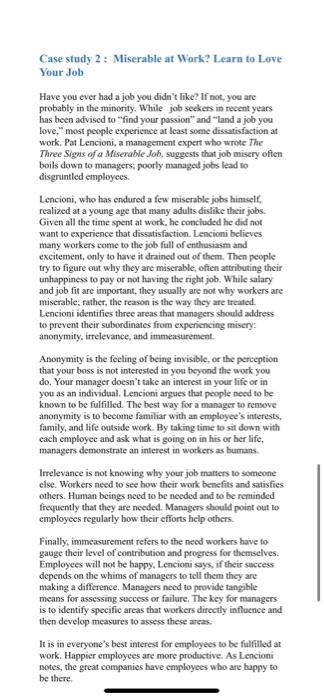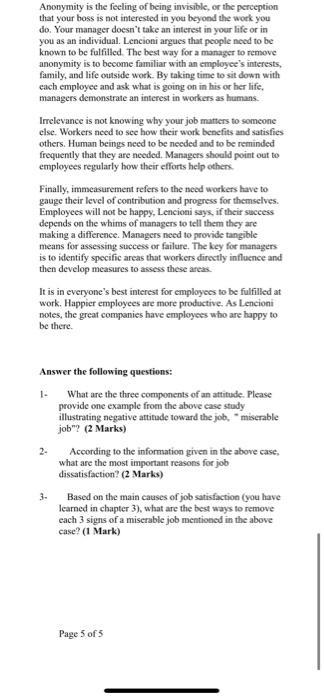Answered step by step
Verified Expert Solution
Question
1 Approved Answer
Case study 2: Miserable at Work? Learn to Love Your Job Have you ever had a job you didn't like? If not, you are


Case study 2: Miserable at Work? Learn to Love Your Job Have you ever had a job you didn't like? If not, you are probably in the minority. While job seekers in recent years has been advised to "find your passion" and "land a job you love," most people experience at least some dissatisfaction at work. Pat Lencioni, a management expert who wrote The Three Signs of a Miserable Job, suggests that job misery often boils down to managers: poorly managed jobs lead to disgruntled employees. Lencioni, who has endured a few miserable jobs himself, realized at a young age that many adults dislike their jobs. Given all the time spent at work, he concluded he did not want to experience that dissatisfaction. Lencioni believes many workers come to the job full of enthusiasm and excitement, only to have it drained out of them. Then people try to figure out why they are miserable, often attributing their unhappiness to pay or not having the right job. While salary and job fit are important, they usually are not why workers are miserable; rather, the reason is the way they are treated. Lencioni identifies three areas that managers should address to prevent their subordinates from experiencing misery: anonymity, irrelevance, and immeasurement. Anonymity is the feeling of being invisible, or the perception that your boss is not interested in you beyond the work you do. Your manager doesn't take an interest in your life or in you as an individual. Lencioni argues that people need to be known to be fulfilled. The best way for a manager to remove anonymity is to become familiar with an employee's interests, family, and life outside work. By taking time to sit down with each employee and ask what is going on in his or her life, managers demonstrate an interest in workers as humans. Irrelevance is not knowing why your job matters to someone else. Workers need to see how their work benefits and satisfies others. Human beings need to be needed and to be reminded frequently that they are needed. Managers should point out to employees regularly how their efforts help others. Finally, immeasurement refers to the need workers have to gauge their level of contribution and progress for themselves. Employees will not be happy, Lencioni says, if their success depends on the whims of managers to tell them they are making a difference. Managers need to provide tangible means for assessing success or failure. The key for managers is to identify specific areas that workers directly influence and then develop measures to assess these areas. It is in everyone's best interest for employees to be fulfilled at work. Happier employees are more productive. As Lencioni notes, the great companies have employees who are happy to be there. Anonymity is the feeling of being invisible, or the perception that your boss is not interested in you beyond the work you do. Your manager doesn't take an interest in your life or in you as an individual. Lencioni argues that people need to be known to be fulfilled. The best way for a manager to remove anonymity is to become familiar with an employee's interests, family, and life outside work. By taking time to sit down with each employee and ask what is going on in his or her life. managers demonstrate an interest in workers as humans. Irrelevance is not knowing why your job matters to someone else. Workers need to see how their work benefits and satisfies others. Human beings need to be needed and to be reminded frequently that they are needed. Managers should point out to employees regularly how their efforts help others. Finally, immeasurement refers to the need workers have to gauge their level of contribution and progress for themselves. Employees will not be happy, Lencioni says, if their success depends on the whims of managers to tell them they are making a difference. Managers need to provide tangible means for assessing success or failure. The key for managers is to identify specific areas that workers directly influence and then develop measures to assess these areas. It is in everyone's best interest for employees to be fulfilled at work. Happier employees are more productive. As Lencioni notes, the great companies have employees who are happy to be there. Answer the following questions: What are the three components of an attitude. Please provide one example from the above case study illustrating negative attitude toward the job, "miserable job"? (2 Marks) 1- 2- 3- According to the information given in the above case, what are the most important reasons for job dissatisfaction? (2 Marks) Based on the main causes of job satisfaction (you have learned in chapter 3), what are the best ways to remove each 3 signs of a miserable job mentioned in the above case? (1 Mark) Page 5 of 5
Step by Step Solution
★★★★★
3.35 Rating (164 Votes )
There are 3 Steps involved in it
Step: 1
Answer components of attitude are a Coginitive component cognitive is the thing to do with knowledge ...
Get Instant Access to Expert-Tailored Solutions
See step-by-step solutions with expert insights and AI powered tools for academic success
Step: 2

Step: 3

Ace Your Homework with AI
Get the answers you need in no time with our AI-driven, step-by-step assistance
Get Started


